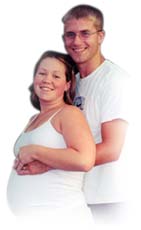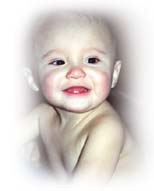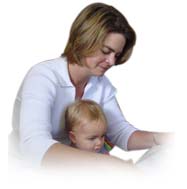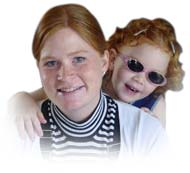Universal Newborn Hearing Screening
Frequently Ask Questions for Birthing Hospital Personnel
Please choose from the questions below for more information about Universal Newborn Hearing Screening / Early Hearing Detection & Intervention:
Pertaining to the screening process:
 Why is a newborn hearing screen important?
Why is a newborn hearing screen important?
Without a hearing screen an infant with hearing loss is usually identified later in childhood, usually around 24-30 months of age. Infants learn a great amount during the first months of life even though they will not typically speak their first words until 12 months of age. Identifying hearing loss and providing early intervention improves a child’s language development.
How are babies screened in the hospital?
There are two standard types of screens used. ABR (AABR, AEP, BAER) stands for Auditory Brainstem Response. This screen is performed by placing electrode pads around the infant’s head and presenting sounds into the infant’s ear through tiny earphones. The equipment computer analyzes the brainwaves.
OAE (DPOAE, TEOAE) stands for Otoacoustic Emissions. This screen is performed by placing a little cushion in the infant’s ear that will present a sound. When the sound reaches the inner ear, the inner ear produces an echo that can be analyzed by the test equipment.
Both screens are easily completed within minutes while the newborn is sleeping.
Why do infants not pass the hearing screen?
Infants can not pass, or refer, the screen for different reasons. Sometimes the problem noted is temporary and may resolve by itself. It is important that the problem is identified. A no passing or “referred” screen means there is need for further evaluation.
I do not feel the screen was performed well. What next?
An infant’s hearing ability can be tested. When results or testing are questionable, referrals are made to ensure the highest quality of care.
 Pertaining to the diagnostic process:
Pertaining to the diagnostic process:
What do I need to do to complete the testing?
A hospital and/or pediatrician should make sure information regarding newborn hearing screening, diagostic evaluation, and follow-up is readily available for parents. Click here for resources available. Click here for list of pediatric audiologists.
What happens during diagnostic testing?
Often the infant will be rescreened. If further testing is needed, an ABR (explained above) may be performed. The appointment often takes 15 minutes to one hour depending on the depth of testing and how calm the infant is during the testing. Testing is best accomplished when the baby is asleep.
Can a parent(s) wait to have their infant's hearing checked?
The younger the infant, the more likely the infant will sleep during the test. As infants get older (three to four months), they are more alert and restless.
It is also important that your infant does not miss out on early language development. Infants begin learning language during the first months of life. An infant with hearing loss needs extra help in communicating and understanding language. If an infant needs extra help, you want to start as early as possible.
 What if a family cannot afford to pay for the evaluation?
What if a family cannot afford to pay for the evaluation?
If your insurance company does not cover a referral for a hearing evaluation, contact the Early Intervention/Infant Learing Program. (Assess if the family needs help getting in touch with EI/ILP. Click here for more information about the program.)
Pertaining to the infant:
This infant doesn't look like he/she has a problem hearing?
It is important to make sure your infant has normal hearing. The hearing test is sensitive and can catch even mild hearing losses that are very difficult for parents to observe. Infants with hearing loss can react similarly to infants with hearing in different situations. Many parents of children identified with hearing loss did not realize the hearing problem until their children were 12-18 months of age. These children missed out on early language development.
What are the chances of an infant having a hearing problem?
Hearing loss occurs in approximately three out of 1,000 babies. The risk of hearing loss is higher for infants who spent time in intensive care nurseries compared to well baby nurseries. It is important to test all infants because only 50% of babies with hearing loss will have know risk factors such as illness or family history. (Click here for list of known risk factors that cause hearing loss in newborns.)
What if an infant has a hearing loss?
Many professionals have dedicated their careers to helping parents and infants with hearing loss. Many materials are available to help parents and families of children with hearing loss. (Click here for resources.)
 If an infant passes the hearing screen, can he/she still develop a hearing loss later?
If an infant passes the hearing screen, can he/she still develop a hearing loss later?
Some babies are born with risk factors ( click here for list of risk factors) that may cause a hearing problem later in infancy or even adulthood. Hearing loss can also be acquired due to illness, infection, or injury. If you think your infant is having difficulty hearing or developing speech and language skills, have your infant’s hearing tested by an audiologist skilled in pediatric evaluation. (Click here for speech and hearing developmental milestone chart. For a list of Alaskan pediatric audiology providers please see Early Hearing Detection & Intervention Pediatric Audiology Links to Services (EHDI-PALS).)
click here for list of risk factors) that may cause a hearing problem later in infancy or even adulthood. Hearing loss can also be acquired due to illness, infection, or injury. If you think your infant is having difficulty hearing or developing speech and language skills, have your infant’s hearing tested by an audiologist skilled in pediatric evaluation. (Click here for speech and hearing developmental milestone chart. For a list of Alaskan pediatric audiology providers please see Early Hearing Detection & Intervention Pediatric Audiology Links to Services (EHDI-PALS).)
